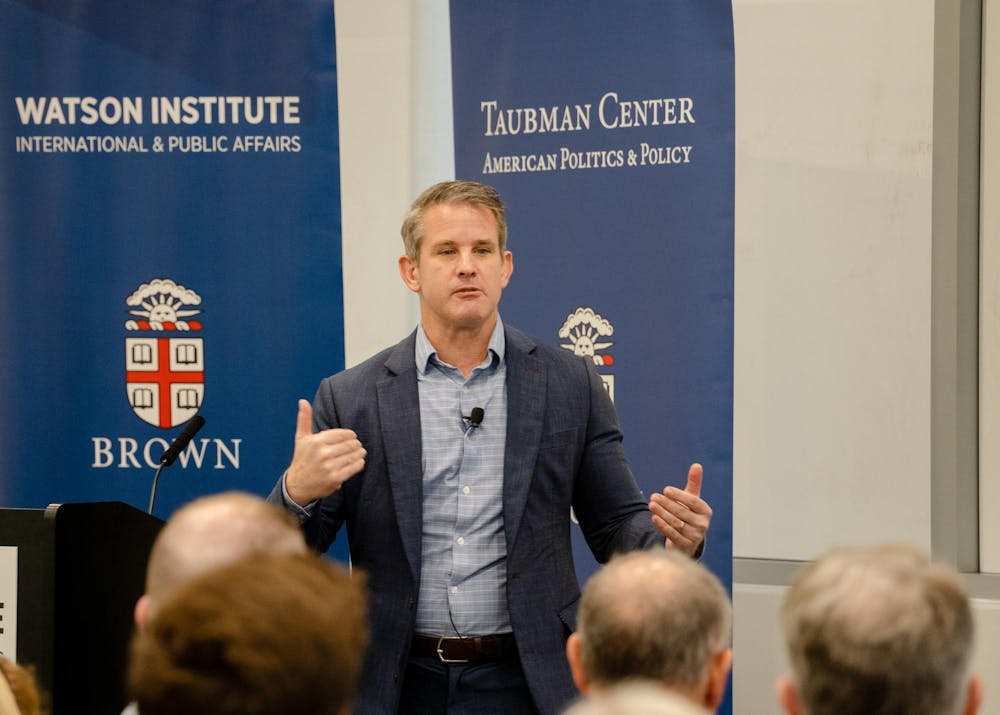On March 11, former Congressman Adam Kinzinger addressed recent challenges of self-governance faced by America and expressed hope for the future of the country at the annual Alexander Meiklejohn Lecture. The event was hosted by the Taubman Center for American Politics and Policy in the Stephen Robert ’62 Hall.
Kinzinger served six terms in the U.S. House of Representatives — where he represented Illinois’s 11th Congressional District for five terms, and the 16th District during his last term — and later served on the nonpartisan select committee to investigate the Jan. 6 insurrection at the U.S. Capitol.
“Kinzinger stood against his own party in pursuit of democracy and justice as one of only two Republicans on the Jan. 6 committee,” said Wendy Schiller, professor of political science and Taubman Center director, who moderated the event in her opening remarks.
During his speech, Kinzinger delved into the nuances of the Jan. 6 insurrection: “We have to look at our heart and (ask), ‘can we truly govern ourselves?’” Kinzinger asked. “Can we truly survive as a self-governing country if that doubt is being exploited to the benefit of any one person?”
He explained that, in his view, a contract exists among the American people, where people have the ability and responsibility to vote. Kinzinger also added that this social contract preserves democracy through an organized transition of power among government representatives.
According to Kinzinger, when such a contract is violated, the understanding that one’s votes matter is destroyed and self-governance fails.
“I worry my two-year-old kid is going to be left (with) a system that is broken … where people don’t believe in (self-governance) anymore,” Kinzinger added. “He’s not going to have the opportunity to be a part of self-governance.”
The Alexander Meiklejohn Lecture, created in honor of former dean and 1893 Brown alumnus Alexander Meiklejohn, is an annual lecture series dedicated to “the theme of Freedom and the U.S. Constitution,” according to the event description.
In 1963, Supreme Court Justice William Douglas delivered the first lecture, Schiller added in her introduction. Other previous speakers have included Stanford Law School Professor Michael McConnell, National Public Radio correspondent Nina Totenberg and Yale Law School Professor Justin Driver ’97.
Kinzinger encouraged Americans to see the threat to democracy as something that should unify Democrats and Republicans, liberals and conservatives alike. “We’re faced with a moment in our own country, where we’ve been so safe for so long that … We’ve turned our fellow Americans into the enemy,” he said.
Carson Bauer ’26, a sophomore studying political science who attended Kinzinger’s talk, told The Herald that he believed the lecture had an optimistic tone.
Kinzinger “definitely painted the future in a good light and it seems like he is conscious that we all have an obligation to fix our democracy,” Bauer said. “It was good to hear him say that.”
For others, the lecture was an opportunity to hear from a different perspective. “I think it is optimistic to hear from a Republican supporting (President) Joe Biden … I agreed with him more than I thought I would,” said Grace Leclerc ’26.
In the long term, Kinzinger said, he is “extremely optimistic” about the U.S. He added that even though there exists a massive burden on the American people to preserve democracy, it is something people must do.

Amber Marcus-Blank is a senior staff writer covering undergraduate student life. She is a sophomore from outside of Boston studying Political Science and Public Health on the pre-law track. She is interested in working in politics and journalism in the future and enjoys playing soccer and making playlists in her free time.





